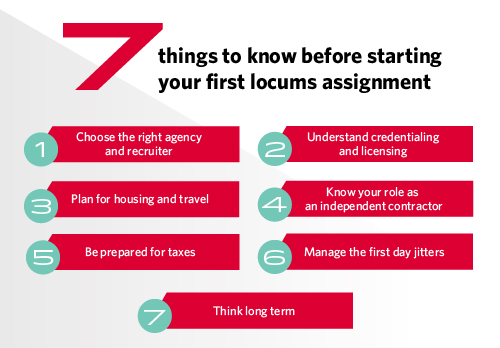7 tips to help you prepare for your first locum tenens assignment
October 22, 2025
Starting your first locum tenens assignment can be both exciting and a little overwhelming. You may be wondering, "What will the hospital expect from me? How do I get licensed in time? Will I feel comfortable walking into a new environment?"
The good news is that thousands of physicians have walked this path before you, and many have shared their advice on what they wish they had known. With preparation and the right support, your first locum tenens assignment can be a rewarding experience that sets you up for long-term success.
Here are some of the most important locum tenens assignment tips from seasoned locum physicians.

1. Choose the right agency and recruiter
Finding a trusted agency is one of the biggest decisions you will make. The right partner will handle details such as licensing, credentialing, housing, and travel, allowing you to focus on practicing medicine.
The size of an agency also matters. Larger firms like Weatherby offer thousands of assignments across specialties, which increases the likelihood of finding the right fit. They also provide dedicated consultants who get to know your personal and professional goals.
Dr. William Barrett, a general surgeon, puts it simply: “Pick one agent that you work well with and stick with that agent.” A long-term relationship fosters trust, enabling your recruiter to anticipate your needs more effectively.

Luckily, I found the best agent in the country and it’s completely worked out.
Working with a well-established agency also has other benefits. “When you work with a big company like Weatherby, there are a lot of personal benefits,” says Dr. Jim Mock, an emergency medicine physician. “For instance, at the end of the year, when it becomes tax time, I only have one source of revenue, so all of my tax reporting is very streamlined.”
The top locum tenens agencies share certain traits: strong reputations, experienced recruiters, comprehensive support services, and membership in the National Association of Locum Tenens Organizations (NALTO).
Take our advice: How to find your first locum tenens assignment
Pro tip: Most providers recommend talking to and interviewing one to three agencies, then sticking with the recruiter who best understands your needs.
2. Understand credentialing and licensing
Credentialing can take longer than you think. Dr. James Hoogeboom, a critical care locum physician, puts it plainly: “Create your own credential file and keep it current so you don’t have to scramble each time that you apply for a new state.”
He continues: “If you have a ‘compact’ state license, make sure that you keep it current. It is like gold.”
Weatherby’s credentialing team handles the heavy lifting, but you play an important role, too. Have your documents, including licenses, board certifications, DEA registration, immunization records, and references, organized and ready to go.
Dr. Mock says the process feels seamless when you are with the right agency: “The credentialing is taken care of in an effortless, free-flowing fashion. All that gets handled so that when I actually show up to work, all I have to do is work.”
For state licensure, the Interstate Medical Licensure Compact (IMLC) can significantly speed things up if you qualify. Weatherby even covers many licensing-related fees and works closely with boards to help expedite applications.
Get the details: How state licensing works for locum tenens
Pro tip: Keep digital copies of all your paperwork in a secure folder. That way, you will save time when new facilities request documentation.
3. Plan for housing and travel
Most new locums are pleasantly surprised by how much support agencies provide. OB-GYN Dr. Ashita Gehlot says from her own experience: “Whenever I have needed anything, the folks at Weatherby have been like, ‘Hey, what can we do to help? How can we make you comfortable?’”

Locum tenens agencies will find new flights, pay for hotels, and ultimately take care of you.
At Weatherby, time-consuming logistics, including coordinating housing and travel arrangements, are handled. You can expect hotel stays for shorter assignments and furnished apartments for longer ones. Preferences, like proximity to the hospital, fitness amenities, or pet-friendly accommodations, are also taken into account.
Travel is arranged around your schedule and needs, whether that means an aisle seat, a particular airline, or mileage reimbursement for driving your own car. Your assignment includes standard airfare and a rental car, but you may want to consider additional perks or upgrades. In these instances, any extra costs incurred will be your responsibility. Likewise, add-ons such as in-flight services, meals, or alcoholic beverages are typically not included.
If something goes wrong, Weatherby has a dedicated 24/7 support line.
Pro tip: Share your travel preferences early (like seat choice, airline rewards, or family travel needs). Once these are in the system, your assignment coordinator can reuse them for every assignment.
4. Know your role as an independent contractor
As a locum tenens physician, you are a 1099 contractor rather than a W-2 employee. While this setup offers greater flexibility and earning potential, it also comes with added responsibilities. For instance, taxes aren’t automatically withheld from your paycheck, and you are in charge of managing your own benefits.
Dr. Gehlot says this is an area worth planning ahead for: “You have to cover your own healthcare, your own disability, and your own retirement planning. Having to deal with those aspects has been a little bit challenging because before, it was taken out of your paycheck before it even hit your desk. So now, we have an accountant.”
Agencies cover malpractice insurance and handle logistics, but you will need to arrange your own health insurance, disability coverage, and retirement savings if you plan to work locums full time.
Learn more from these resources:
Pro tip: Many physicians transition to locums gradually by keeping W-2 employment while trying locums part time. This can help ease the adjustment.
5. Be prepared for taxes
Taxes are one of the most common surprises for new locums. Unlike W-2 employees, locum physicians must pay self-employment tax and estimated quarterly taxes, which cover their share of Medicare and Social Security.
The upside? You can deduct many work-related expenses, from travel to retirement contributions. Save your receipts and consult your tax advisor.

The first time I filed taxes as an independent contractor, I did not realize how different it would be. I had to adjust to setting aside money for quarterly payments.
Common tax deductions for locum tenens physicians include:
Retirement contributions
Health and dental insurance premiums
Health savings account (HSA) contributions
Home office expenses
Conference fees or continuing education courses
Work materials like scrubs, stethoscopes, and other supplies
Electronics like smartphones, tablets, or computers
Meals and other incidentals (for assignments under one year)
Other unreimbursed expenses like phone bills, vehicle mileage, parking, and tolls
Get started with Weatherby’s locum tenens tax guide and consult with a tax professional to set up the right system from day one.
Pro tip: Use a separate bank account for tax savings. Deposit 25 to 30% of each paycheck into that account so quarterly payments don’t catch you off guard.
6. Manage the first day jitters
Many physicians feel nervous before their first shift in a new hospital. “I did not know what to expect or how I would be perceived by the hospital,” says Dr. Sirish Kondabolu, an orthopedic surgeon whose medical career began with locums. “What I wished I had known prior to starting is that the hospital is more used to having locums providers than I was being one!”
Dr. Demetri Poulis, a locum tenens general surgeon, offers reassurance: “It can be daunting to enter a new hospital and, from day one, be the person making all these decisions. But no matter the place or situation, people are people, and they will respect the care that you give.”
You always worry about going to new places and what you’re going to find, but my consultant always prepared me well. She always told me what I needed to be doing and that has made it easy.
Dr. Mock agrees: “The only downside that I have found to working locums is that there is a bit of anxiety in going to new contracts. Adjusting to the nuances of being at a new contract and getting used to their system can be challenging.”
Orientation usually includes a quick tour and an EMR crash course. Don’t worry if it feels overwhelming. As Dr. Kusnezov notes: “This is on-the-job training. Whether you have used Epic, Oracle, or some other system, you will pick it up quickly on your first day.”
Pro tip: Be proactive. Introduce yourself to nurses and staff right away and ask questions about workflows. A little friendliness goes a long way toward making you feel at home.
7. Think long term
Many physicians who start locums later in their careers wish they had tried it sooner. ENT physician Dr. David Barnes shares: “I was pleasantly surprised at how much I enjoyed the work, the travel, and working with new, good people. I have thoroughly enjoyed the change of scenery, time off that’s really time off, and a much less stressful life. I wish I had done it as soon as my last child left for college instead of waiting for retirement.”
Locums doesn’t have to be a temporary, stopgap solution. For many, it is a way to extend their careers with reduced stress. For others, it is a path to explore different practice settings or geographic areas before settling down.

It is really nice that locums allows you to not feel like you are separated from your family. There is this idea that you’re a traveling doctor, so then your family gets compromised. I haven’t felt that.
Go forth and find the right assignment for you!
Starting your first locum tenens assignment can feel intimidating, but with preparation and the right support, you will quickly discover the benefits of this lifestyle’s unique balance of work and play.
Choose an experienced agency, get your paperwork in order, plan ahead for housing and travel, and stay on top of finances. Most importantly, remember that you are not alone. Thousands of physicians have been in your shoes and found locums to be one of the most rewarding decisions of their careers.
Want to learn more about locum tenens? Give us a call at 954.343.3050 or view today’s locum tenens job opportunities.
